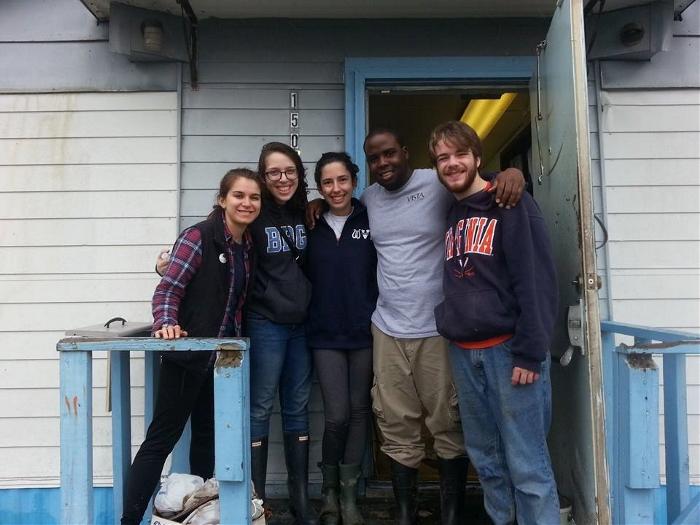The trip was well timed in another way as well. Although the congregants we met were passionate about their Jewish heritage and culture, the economic challenges of the Delta are increasingly driving young Jews (and other young people with the resources to leave) away from the region. The synagogues we visited were as beautiful as any I’ve seen in New York or in Israel, but the force of vacancies in the towns around them might eventually overcome the vivacity of Jewish life.
At Mississippians Engaged in Greener Agriculture, or MEGA, we learned how to care for chickens, build rabbit coops, and prepare soil for planting. We also worked in the food pantry, preparing boxes to be picked up. At first, the food pantry work confused me: MEGA aims to reduce diet-related illness by providing fresh fruits and vegetables, but we were handing out packages of processed foods, high-sugar desserts and low-nutrient canned goods, all donated by Wal-Mart. How could the food pantry and the garden outside be part of the same organization? Were they truly working toward the same goal? Over the course of the week, we were fortunate to be able discuss these questions. We realized that although healthful food is the ultimate goal, any food is better than no food. We also came to understand that the boxes handed out in early March, well before the harvest season, are not representative of those provided at other times in the year. Driving around the Delta, I was exposed to a part of American life that I had not seen up-close before. Growing up in one of the nation’s wealthiest counties and then moving to a college town, I’d never imagined towns where the majority of the stores were shut down, where the only place to get something to eat was at a gas station. I’ve also been fortunate to always have a sizable Jewish community around me. Before hearing the stories of Jews in Cleveland and Greenville, I couldn't imagine being the only Jewish student in school, or barely having enough Jewish adults in town to make a minyan. At the same time, I realized that the experiences of people in the Delta - both Jews and non-Jews - are not so different from mine. I have also had to make choices about maintaining Jewish customs or assimilating. I’ve also observed inequalities and racism. Many people we spoke with in the Delta asserted that Mississippi’s experience shines a spotlight on problems the entire United States faces. They said that their communities are not the only ones with injustices and lack of opportunity, but because the disparities are so great in Mississippi, the nation notices them more. Our local guides did not see this spotlighting as a problem - in fact, some maintained that the extra attention motivates Mississippians to make positive change, and that Mississippi leads the country in this initiative as well. Three nights after returning to Charlottesville, an incident of police violently arresting a black third year University student showed me the wisdom of those opinions. We cannot escape injustice by getting on a plane and leaving Mississippi. Right here in Virginia, less than a mile from my apartment, footsteps away from our beloved Grounds, a third year student was beat up by officers of the Virginia Alcoholic Beverage Control (ABC), presumably for trying to use a fake ID to get into a bar. I don’t know the specifics of the situation, so it would be unfair to say that Martese Johnson was beat up and arrested because he was publicly drunk, or because he is black. But I do know that on any given night on the Corner, and especially on a warm St. Patty’s evening, there are many students, black and white, 21 and underage, partying in the bars and belligerently drunk on the street outside them. I’ve never heard of an incident of police brutality on the Corner before - in fact, I am usually amazed at how little the local police respond to the underage drinking that occurs every night - so I have to wonder why this happened to Martese. It should not have happened to anyone. Martese’s story has shown me that we need to learn from the Mississippians we met and from the Jewish values of Tikkun Olam that we discussed last week. If we see injustices, we must work to resolve them. Violent acts like those in the video of Martese on the sidewalk cannot be tolerated, no matter the race of the people involved. Charlottesville, like the Mississippi Delta, has its own challenges, and we must all work to overcome them. -Sarah Hainbach Class of 2015 |
The Brody Jewish Center, Hillel at the University of Virginia, is the focal point in a renaissance of Jewish life for the 1,000 Jewish students on Grounds. Archives
September 2021
Categories
All
|

 RSS Feed
RSS Feed